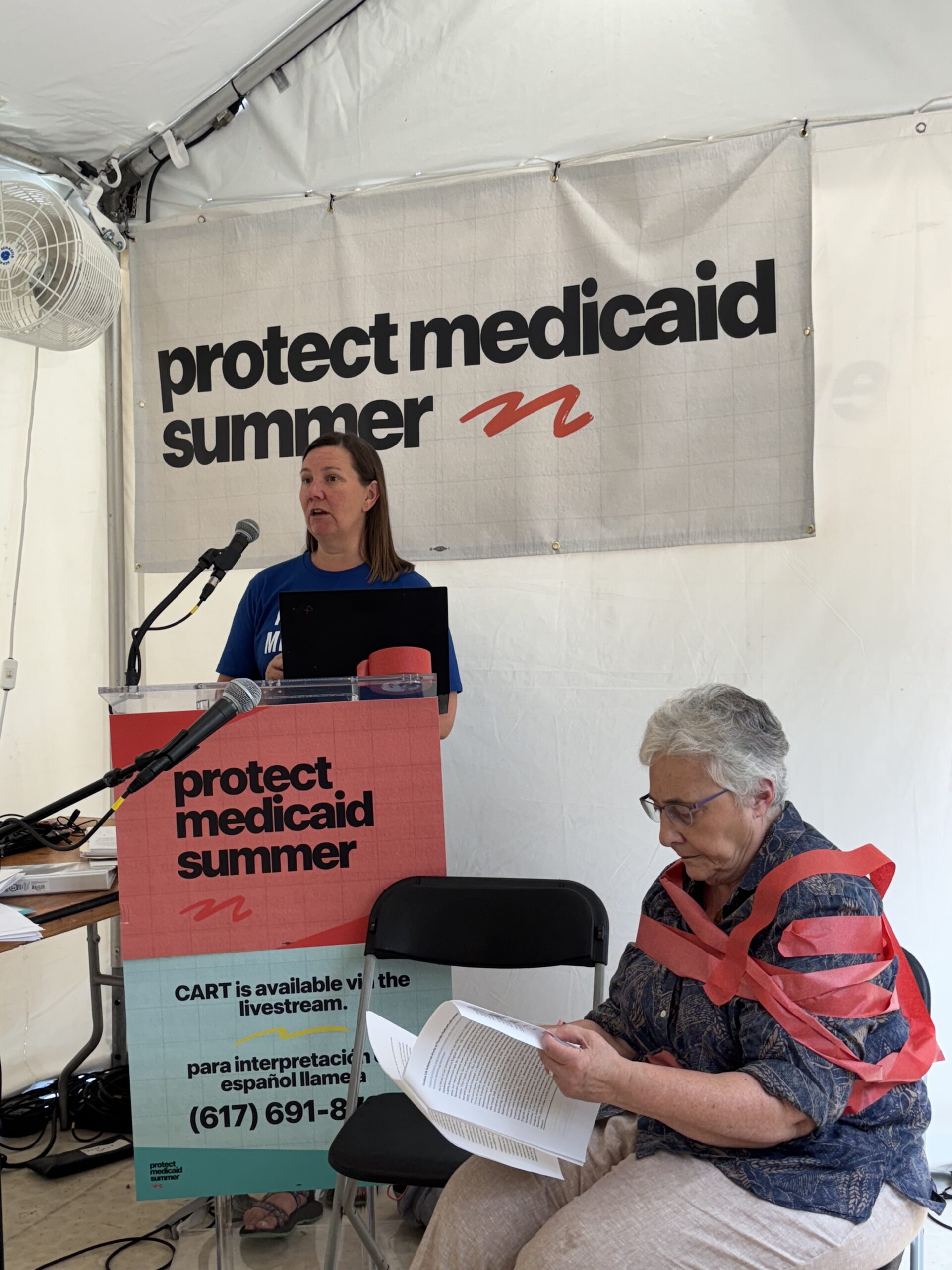
The 60-Hour Vigil to Protect Medicaid
Marking the 60th anniversary of Medicare and Medicaid, the Coalition on Human Needs was proud to partner in the 60-hour Vigil to Protect Medicaid (held from July 23-26 outside the nation’s Capitol), led by the organization Caring Across Generations.
 Over two of those hours, Meredith Dodson, CHN’s Senior Director of Public Policy and I read stories of people for whom Medicaid was essential. In most of the stories, Medicaid coverage was keeping people independent, alive, and able to live with their families at home. But I wanted to remind people of the dire impacts of rigid documentation requirements – red tape – at the heart of the drastic Medicaid cuts recently enacted by Congress.
Over two of those hours, Meredith Dodson, CHN’s Senior Director of Public Policy and I read stories of people for whom Medicaid was essential. In most of the stories, Medicaid coverage was keeping people independent, alive, and able to live with their families at home. But I wanted to remind people of the dire impacts of rigid documentation requirements – red tape – at the heart of the drastic Medicaid cuts recently enacted by Congress.
So my colleagues wrapped me in red tape as I spoke of what happened when Arkansas attempted to implement work requirements in its Medicaid program in 2018. In Arkansas, 18,000 people lost Medicaid over a six month period. A court order halted the program in 2019. A study of Arkansas’ program published in Health Affairs found that the “percentage of Arkansans ages 30–49 with Medicaid or Marketplace coverage dropped from 70.5 percent in 2016 (before the work requirements) to 63.7 percent in 2018 (during the time the work requirements were active) and rose to 66.1 percent in 2019 (when the work requirements were no longer in effect)… The uninsurance rate for Arkansans ages 30–49 rose from 10.5 percent in 2016 to 14.6 percent in 2018 and then went back down to 12.5 percent in 2019. Meanwhile, the uninsurance rate for adults ages 30–49 in our comparison states was fairly stable for all three years.”
People lost insurance when they could not comply with the reporting requirements, although research found that 95 percent of the group subject to the rules were either working or would be exempt because of health issues, having children, etc. During the time they went without Medicaid coverage, about half reported serious problems paying off medical debt, nearly 56 percent delayed needed care, and 64 percent delayed taking medications because of the cost.
 They were supposed to report monthly on their work or exempt status, and for most of 2018, they had to do it via computer. Those surveyed had little access to a computer and preferred using a phone, but that wasn’t an option for many months. Many people did not know about the requirements, in some cases because they had moved and the state did not have their correct address. Few knew that the work reporting requirements had been discontinued because of the court order, and so did not know they could reapply.
They were supposed to report monthly on their work or exempt status, and for most of 2018, they had to do it via computer. Those surveyed had little access to a computer and preferred using a phone, but that wasn’t an option for many months. Many people did not know about the requirements, in some cases because they had moved and the state did not have their correct address. Few knew that the work reporting requirements had been discontinued because of the court order, and so did not know they could reapply.
Adrian McGonigal was among those who lost Medicaid. As reported by TradeOffs.org, he worked full-time in a chicken processing plant, and reported that to Medicaid when the Arkansas work documentation rules began. He did not realize he had to keep reporting monthly, and learned he had been dropped from a pharmacist when he tried to fill his prescription for his serious lung disease. He was unable to pay the $800 prescription cost and over time became more ill. He lost his job and was unable to keep even part-time work. He eventually qualified for disability benefits, but by then his health was seriously weakened and he died of a heart attack at age 46.
The new law that will cut health programs by about one trillion dollars over the next decade will impose such red tape requirements in all states. The “savings” will come at a very high cost
Medicaid saves lives. It allows people to work. It provides the care that allows children with serious medical conditions to go to school and allows their parents to go to work. Requiring repeated reporting of work hours or exempt status will hurt people. It will not increase work participation; it didn’t in Arkansas.

